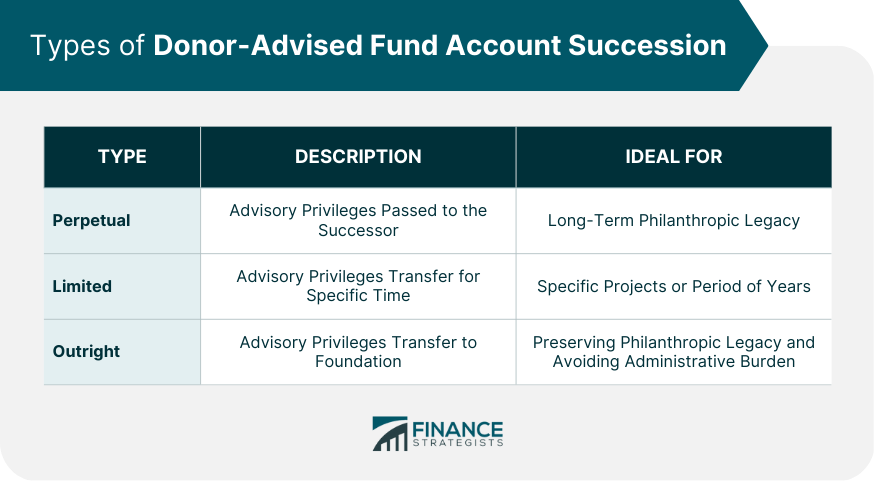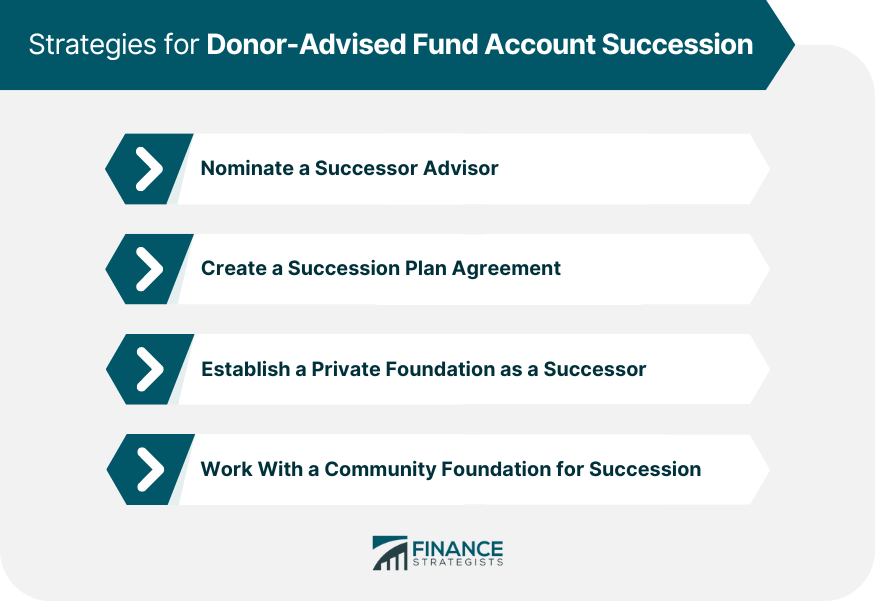Donor-advised fund account succession is the process by which a donor-advised fund account is passed on to a designated individual or entity after the original donor is no longer able or willing to manage it. Succession planning can help donors ensure that their charitable legacy lives on beyond their lifetime and that their contributions continue to support the causes they care about. Succession planning for donor-advised funds is important for several reasons. It allows donors to ensure that their charitable vision continues after their passing or disengagement from the fund. It helps avoid disruption in the fund's operations and allows for a smooth transition of the donor's advisory responsibilities. It can help donors ensure that their philanthropic values are passed on to the next generation. Several factors should be considered when planning for donor-advised fund account succession. One key consideration is the nature of the donor's charitable goals and priorities. The donor's goals may differ depending on the type of causes they support, the geographic location of their philanthropic interests, and the duration of their giving. Additionally, donors should consider the qualifications and experience of potential successors and whether they share the same charitable vision.
When planning for donor-advised fund account succession, it is essential to take into consideration several factors that can ensure that their charitable vision continues for generations to come. One of the most important factors to consider when planning for donor-advised fund account succession is the nature of the donor's charitable goals and priorities. Donors may have different philanthropic interests, including the causes they support. Identifying these interests and priorities is crucial to ensure that the donor's charitable vision is carried out effectively after their passing or disengagement from the fund. Another essential factor to consider when planning for donor-advised fund account succession is the qualifications and experience of potential successors. Potential successors should have the necessary skills and knowledge to effectively manage the donor-advised fund account and distribute grants to the donor's preferred charities. Donors should also consider whether potential successors share the same philanthropic values and vision to meet their charitable goals. The geographic location of the donor's charitable giving is also a crucial factor to consider when planning for donor-advised fund account succession. Donors may have a specific focus on local or international causes, and it is essential to identify the preferred locations of the donor's charitable giving. Identifying the geographic location of the donor's giving can help ensure that potential successors have the necessary knowledge and expertise to effectively manage the donor-advised fund account. The duration of the donor's charitable giving is another factor to consider when planning for donor-advised fund account succession. Donors may have a specific time frame in mind for their charitable giving, such as supporting a specific project or cause for a set number of years. Identifying the duration of the donor's giving can help ensure that the succession plan aligns with the donor's philanthropic vision. There are three main types of donor-advised fund account succession: perpetual, limited, and outright. Each type of succession has its own advantages and disadvantages and should be carefully considered based on the donor's specific needs. With perpetual succession, the donor's advisory privileges are passed on to a successor advisor who will manage the donor-advised fund account in perpetuity. This type of succession is ideal for donors who want to ensure their philanthropic legacy lasts beyond their lifetime. Perpetual succession also allows for the continued distribution of grants to the donor's preferred charities. Limited succession involves the transfer of advisory privileges to a successor advisor for a specific period of time. This type of succession is ideal for donors who want to ensure that their charitable goals are met during a certain period, such as a specific project or a set number of years. Limited succession allows for the donor to retain some control over the distribution of their funds. With outright succession, the donor's advisory privileges are transferred to a private foundation or community foundation. This type of succession is ideal for donors who want to ensure that their philanthropic legacy is preserved in perpetuity while avoiding the administrative burden of managing the fund. Outright succession also allows for the donor's contributions to benefit from the community foundation's expertise in grantmaking and charitable giving. Several strategies can be used to plan for donor-advised fund account succession. Some of these strategies include nominating a successor advisor, creating a succession plan agreement, establishing a private foundation as a successor, and working with a community foundation for succession. One of the most straightforward strategies for donor-advised fund account succession is to nominate a successor advisor. The donor can choose someone they trust to take over their advisory responsibilities once they can no longer fulfill them. The donor should consider the qualifications and experience of the potential successor and whether they share the same philanthropic vision. Creating a succession plan agreement is another effective donor-advised fund account succession strategy. This agreement outlines the donor's wishes and expectations for their fund account after their passing or disengagement. The agreement should specify who the successor advisor will be, how long their advisory privileges will last, and any other important details. For donors who want to preserve their philanthropic legacy in perpetuity, establishing a private foundation as a successor is a viable option. The private foundation can be established during the donor's lifetime or in their will. The private foundation can continue the donor's charitable mission and distribute grants to the donor's preferred charities. Working with a community foundation for succession is another option for donors who want to preserve their philanthropic legacy. The community foundation can manage the donor-advised fund account and distribute grants to the donor's preferred charities. Community foundations have expertise in grantmaking and charitable giving and can help meet the donor's charitable goals. Several considerations should be taken into account when planning for donor-advised fund account succession. These considerations include tax implications, legal requirements, and communication with potential successors and family members. Donors should be aware of the tax implications of donor-advised fund account succession. In some cases, succession may trigger capital gains, income, or estate taxes. Donors should consult with a tax professional to ensure that their succession plan is structured in a tax-efficient manner. There are also legal requirements that donors must consider when planning for donor-advised fund account succession. For example, donors may need to update their estate plan to ensure that their wishes are reflected in their will or trust. Additionally, succession plans may need to comply with state laws governing charitable giving and nonprofit organizations. Donors should communicate with potential successors and family members about their succession plans to ensure everyone knows their wishes. This can help avoid conflicts and ensure that the donor's charitable goals are met. Donors should also consider providing education and training to potential successors to ensure that they are prepared to take on their advisory responsibilities. Donor-advised fund account succession planning is an important consideration for donors who want to ensure that their charitable legacy lives on. By understanding the factors to consider, the types of succession, and the strategies available, donors can create a succession plan that meets their unique philanthropic goals. Donors should also be aware of succession's legal and tax implications and communicate their wishes to potential successors and family members. To ensure that your succession plan is structured in a tax-efficient manner, seek the guidance of a tax planning professional. With careful planning and execution, donor-advised fund account succession planning can help you create a lasting impact on the causes you care about.What Is Donor-Advised Fund Account Succession?
Factors to Consider When Planning for Donor-Advised Fund Account Succession
Nature of the Donor's Charitable Goals and Priorities
Qualifications and Experience of Potential Successors
Geographic Location of the Donor's Charitable Giving
Duration of the Donor's Charitable Giving
Types of Donor-Advised Fund Account Succession
Perpetual Succession
Limited Succession
Outright Succession

Strategies for Donor-Advised Fund Account Succession
Nominating a Successor Advisor
Creating a Succession Plan Agreement
Establishing a Private Foundation as a Successor
Working With a Community Foundation for Succession

Key Considerations for Donor-Advised Fund Account Succession
Tax Implications
Legal Requirements
Communication With Potential Successors and Family Members
Final Thoughts
Donor-Advised Fund Account Succession FAQs
Donor-advised fund account succession planning is the process by which a donor-advised fund account is passed on to a designated individual or entity after the original donor is no longer able or willing to manage it.
Donor-advised fund account succession planning is important to ensure that a donor's charitable vision continues after their passing or disengagement from the fund, avoid disruption in the fund's operations, and pass on philanthropic values to the next generation.
The three main types of donor-advised fund account succession are perpetual, limited, and outright. Each type of succession has its own advantages and disadvantages and should be carefully considered based on the donor's specific needs.
Strategies for donor-advised fund account succession planning include nominating a successor advisor, creating a succession plan agreement, establishing a private foundation as a successor, and working with a community foundation for succession.
Considerations for donor-advised fund account succession planning include tax implications, legal requirements, and communication with potential successors and family members. Donors should consult with a tax professional to ensure that their succession plan is tax-efficient and comply with state laws governing charitable giving and nonprofit organizations. Donors should also communicate their wishes to potential successors and family members to avoid conflicts and meet their charitable goals.
True Tamplin is a published author, public speaker, CEO of UpDigital, and founder of Finance Strategists.
True is a Certified Educator in Personal Finance (CEPF®), author of The Handy Financial Ratios Guide, a member of the Society for Advancing Business Editing and Writing, contributes to his financial education site, Finance Strategists, and has spoken to various financial communities such as the CFA Institute, as well as university students like his Alma mater, Biola University, where he received a bachelor of science in business and data analytics.
To learn more about True, visit his personal website or view his author profiles on Amazon, Nasdaq and Forbes.











